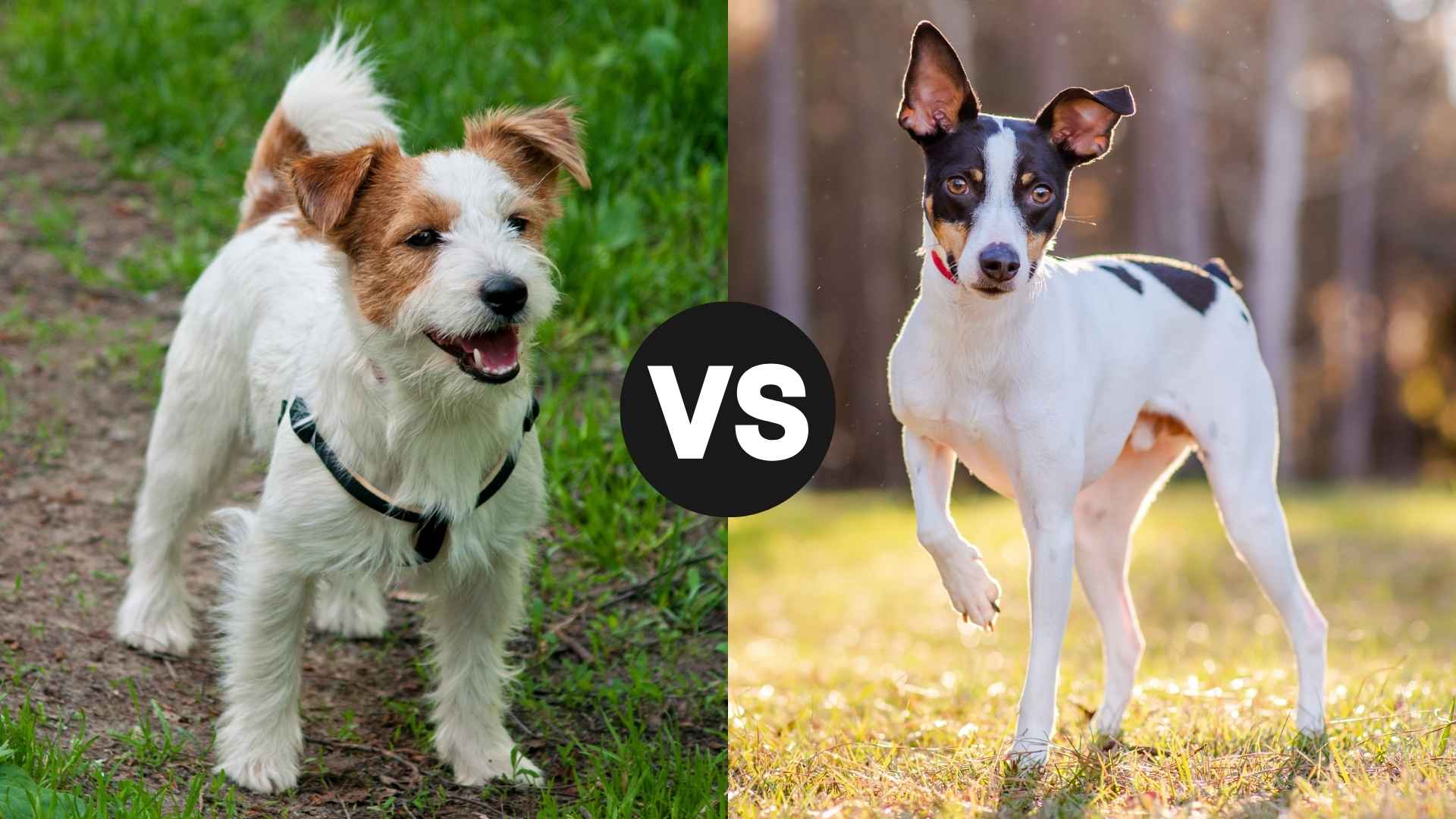Thinking of getting a small, feisty pup but torn between the Jack Russell Terrier and the Rat Terrier? You’re not alone. These two breeds may look a little alike, but they’ve got totally different vibes once you get to know them. Both are bursting with energy and attitude—but trust us, they’re not interchangeable.
Jack Russells? Total firecrackers. These dogs are all go, no chill. Super smart, a little bossy, and always on the hunt—literally. They were bred to chase foxes, and that drive is still very much alive. You’ll never have a boring moment with one around (or any peace and quiet, let’s be honest).
Rat Terriers, on the other hand, are the underrated multitool of the dog world. Still energetic, but a bit more laid-back and family-friendly. They’re natural vermin hunters too, but tend to be more eager to please and less chaotic than their Jack Russell cousins.
Jack Russell Terrier vs. Rat Terrier
Jack Russell Terrier vs. Rat Terrier: Key Differences
The biggest difference between a Jack Russell Terrier and a Rat Terrier comes down to energy and attitude. Jack Russells are high-octane, stubborn little dynamos—super smart, but they’ve got a mind of their own and love to test boundaries. They’re working dogs at heart and need tons of stimulation.
Rat Terriers, while still energetic and sharp, are more easygoing and people-pleasing. They’re generally more trainable, better with kids, and not quite as intense. Think of Jack Russells as the wild child and Rat Terriers as the clever sidekick who actually listens.
|
Trait |
Jack Russell Terrier |
Rat Terrier |
|---|---|---|
|
Energy Level |
Extremely high – always on the go |
High, but more manageable |
|
Trainability |
Stubborn, independent thinker |
Eager to please, more obedient |
|
Temperament |
Bold, intense, fearless |
Friendly, playful, more relaxed |
|
Good with Kids |
Can be, but needs supervision |
Generally better with children |
|
Prey Drive |
Very strong – bred for fox hunting |
Strong, but less intense than JRT |
|
Noise Level |
Vocal and alert |
Alert but typically quieter |
|
Living Situation |
Needs space and stimulation |
Adapts better to various environments |
|
Best For |
Active owners who love a challenge |
Families or first-time dog owners |
Jack Russell Terrier vs. Rat Terrier: Breed Origin
Jack Russell Terrier: Breed Origin
The Jack Russell Terrier didn’t just show up out of nowhere—it was built for a mission. This little powerhouse was developed in 19th-century England by a clergyman named Reverend John Russell, who wanted the ultimate fox-hunting sidekick. And wow, did he nail it.
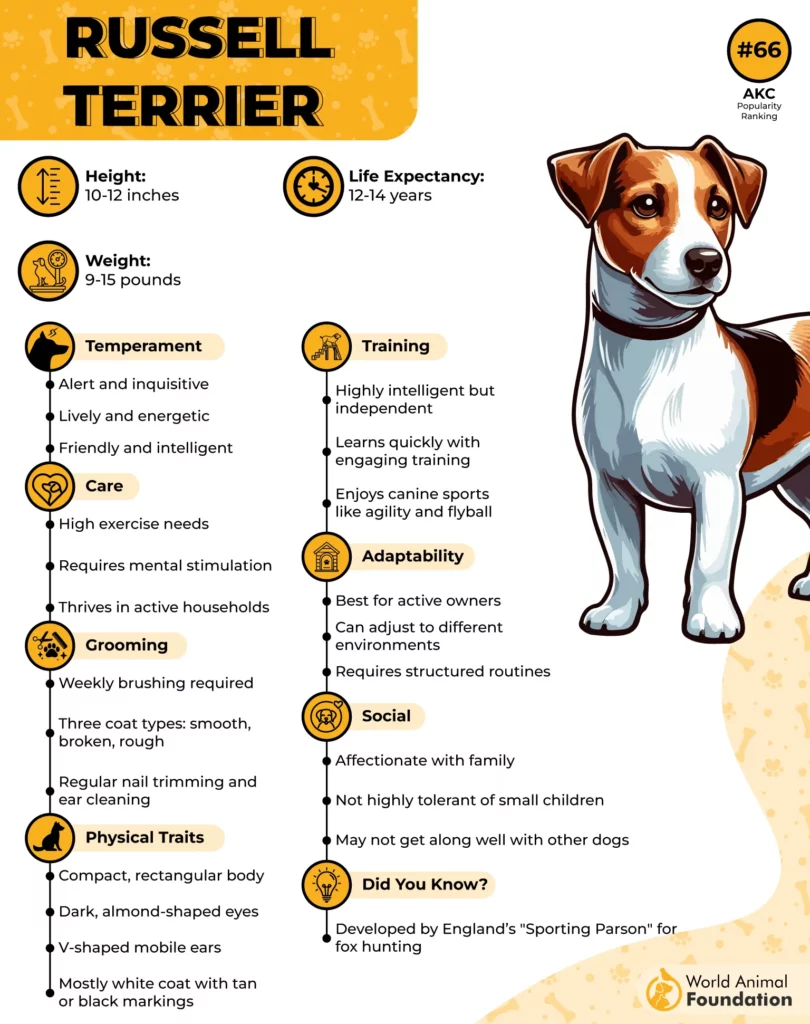
According to Britannica, these dogs were bred to be fearless, fast, and small enough to dive into fox dens. That “go-go-go” energy you see in every Jack Russell? Yeah, that’s all by design.
Originated in Devon, England
Created specifically for fox hunting
Named after Reverend John Russell
Unlike some modern designer breeds, Jack Russells haven’t strayed far from their roots. Their instincts are still sharp, and they love having a job to do. Ever seen a Jack Russell chasing a squirrel like it’s a life-or-death mission? That’s 200 years of instinct in action. You can take the dog out of the hunt—but not the hunt out of the dog.
And don’t be fooled by their size. These pups are pure working dogs with a “don’t tell me what to do” attitude. They’ve got that scrappy, old-school vibe that makes them both frustrating and fascinating. If you’re into dogs with character (and a bit of chaos), this breed’s backstory explains a lot.
Rat Terrier: Breed Origin
Now, the Rat Terrier? Whole different story. Born and raised in the U.S., this breed is a true American farmhand. Originally bred for—you guessed it—rat control, they were the go-to pest busters for farmers in the 19th and early 20th centuries. No rats, no wasted grain, no problems. These little guys weren’t just pets; they were employees.
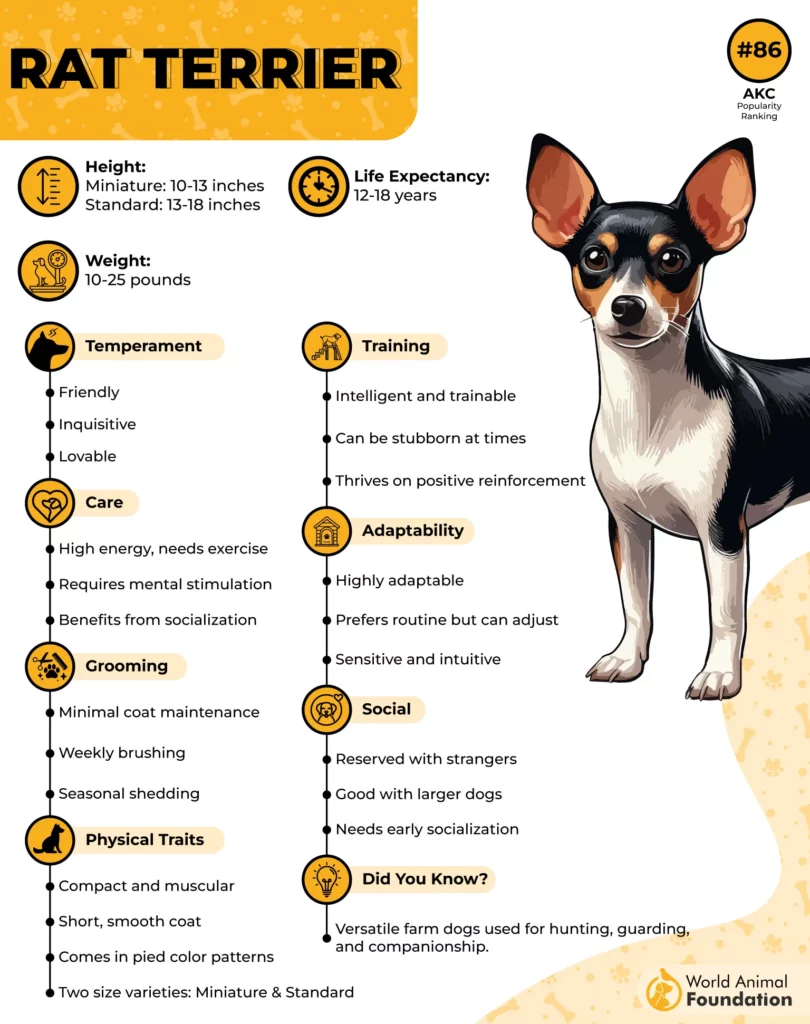
Originated in the United States
Bred for farm work and pest control
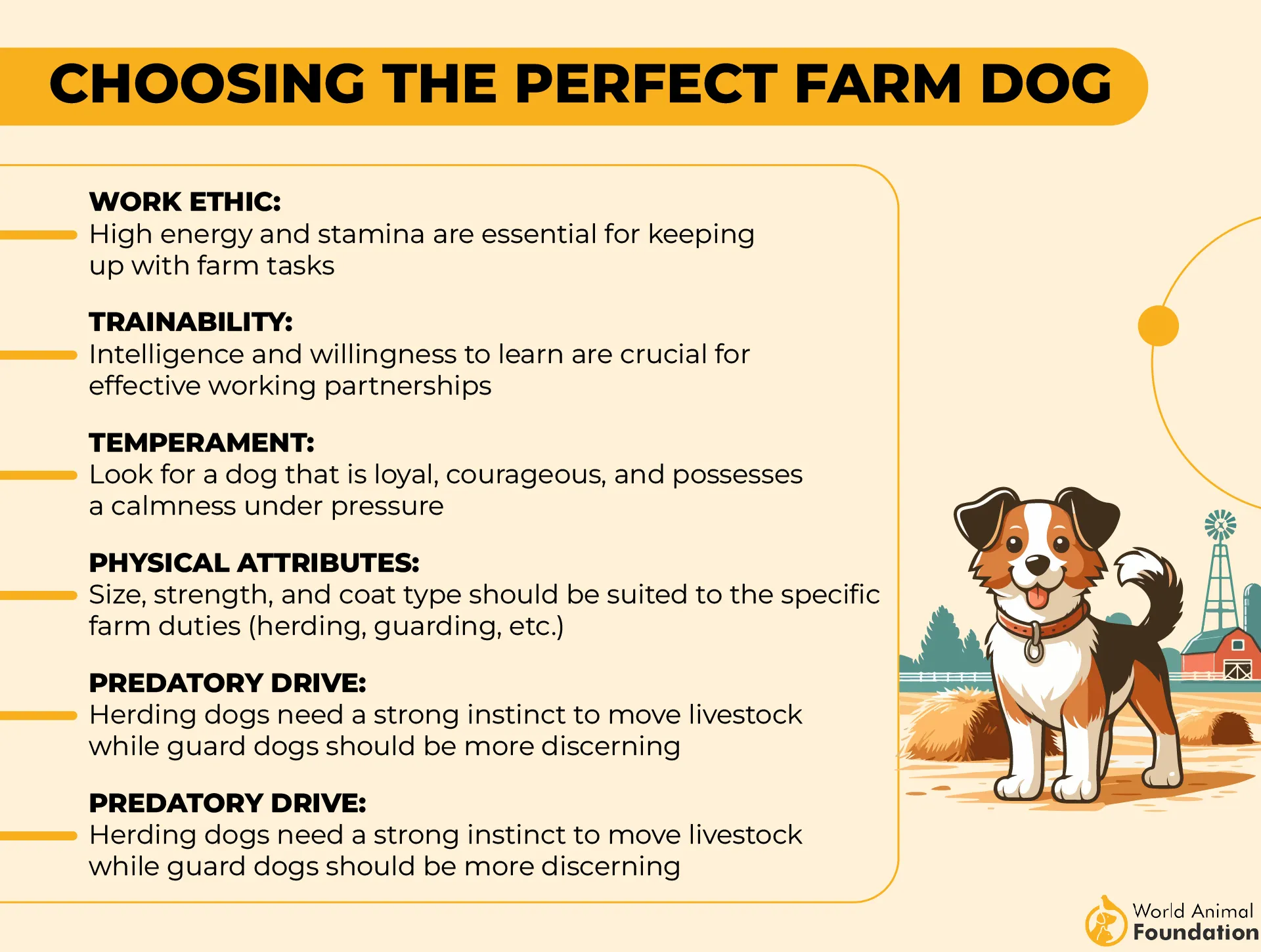
Influenced by breeds like the Whippet, Beagle & Manchester Terrier
What makes the Rat Terrier extra cool is how adaptable it has become. As farms changed, so did the Rat Terrier. People realized they weren’t just great at killing rats—they were loyal, devoted, fun, and super trainable, states Purina. That’s how they went from barn buddies to family dogs. Still feisty, but with a softer edge compared to the Jack Russell.
And hey, ever wonder why they’re faster and more agile than you’d expect? That’s the Whippet genes kicking in. A little speed, a little scent hound, and a whole lot of smarts. Rat Terriers are like the Swiss Army knife of small dogs: compact, clever, and ready for anything.
Jack Russell Terrier vs. Rat Terrier: Physical Size
Jack Russell Terrier: Physical Size
Jack Russell may be small, but don’t let that fool you—they’re all muscle and momentum. These dogs are compact athletes. According to AKC, typically standing 10–12 inches tall and weighing around 13–17 pounds, they’re the definition of “small but mighty.” Have you ever seen a Jack Russell leap like a kangaroo? Yeah, they’ve got springs in those legs.

Height: 10–12 inches
Weight: 13–17 pounds
Build: Compact, muscular, agile
What makes their size so perfect is that it’s functional. They were literally built to slip into fox burrows—tight, quick, and agile. Their chiseled little frames aren’t just cute—they’re practical. No fluff, no bulk, just pure go-mode wrapped in fur.
And despite being pint-sized, they carry themselves like they’re 100 pounds. Chest out, tail up, always ready to start something. Seriously, who told them they were small? Because they didn’t get the memo.
Rat Terrier: Physical Size
Rat Terriers come in a few size flavors—so you’ve got options. There’s the Toy (under 10 lbs), Miniature (10–13 inches), and Standard (13–18 inches), with weights ranging anywhere from 10 to 25 pounds, depending on type, says AKC. So yeah, whether you want a small lap rat or a sturdier backyard buddy, there’s a Rat Terrier for that.

Height: 10–18 inches (depending on type)
Weight: 10–25 pounds
Build: Sleek, lean, athletic
Their bodies are built more for speed and agility, less for brute force. Long legs, slightly leaner frames, and a more aerodynamic look overall—thanks in part to their Whippet ancestry. They move like little rockets and look good doing it.
Also, unlike Jack’s “all one size” vibe, Rat Terriers give you some wiggle room. Want a smaller, apartment-friendly pup? Go Mini. Want something sturdier for outdoor life? Standard’s your guy. It’s like the same personality, just different packaging.
Jack Russell Terrier vs. Rat Terrier: Temperament and Personality
Jack Russell Terrier: Temperament and Personality
Let’s be real—Jack Russell has big main character energy. These dogs are bold, intense, and totally unapologetic about it. VCA states that they’re fearless, fiercely independent, and sometimes a little too smart and intelligent for their own good. Training one? That’s not a casual task—it’s a mental chess match.
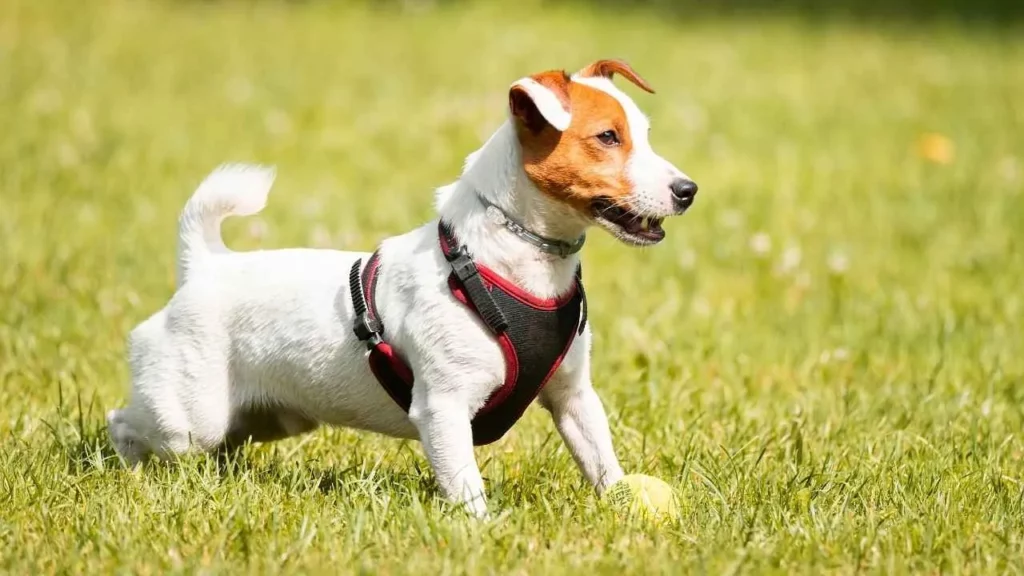
Fearless and bold
Independent thinker (aka: stubborn)
Super energetic, always on the go
These pups need a job. If they don’t have one, they’ll invent one—like digging a tunnel to the center of the earth or chasing invisible squirrels. They’re hilarious, but not for the faint of heart. If you want a cuddly lap dog, hard pass. If you want a dog with personality for days and don’t mind a little chaos? Jackpot.
And yeah, they can be a little bossy. Don’t be surprised if your Jack tries to run the house. They’ll test your patience, but also make you laugh daily. Just don’t expect them to chill—they didn’t come wired that way.
Rat Terrier: Temperament and Personality
Now Rat Terriers? Same energy, but with a dash of chill. These dogs are spunky, smart, and love being part of the action—but they’ve got better manners (usually). WebMD states that they’re affectionate, loyal, and generally more eager to please. Basically, they’re team players… with a little mischief on the side.

Friendly and affectionate
High energy, but more balanced
Loyal and people-focused
Unlike Jack’s “I do what I want” vibe, Rat Terriers are more like “What’s the plan, and how can I help?” They bond hard with their humans and love being involved, whether that’s playing fetch, chasing a toy, or just hanging out.
But don’t get it twisted—they’ve still got plenty of drive. They were bred to hunt vermin, after all. So while they’ll cuddle more than a Jack, they’re still down for an adventure at a moment’s notice. They just come with an off switch, which is kind of a big deal.
Jack Russell Terrier vs. Rat Terrier: Training Agility
Jack Russell Terrier: Training Ability
Training a Jack Russell? Oh, it’s a ride. These dogs are crazy smart—but they know it. That means they’ll pick up commands fast… if they feel like it. They’re not trying to be difficult, they just have their own plans. Consistency, creativity, and a sense of humor are your best friends here.
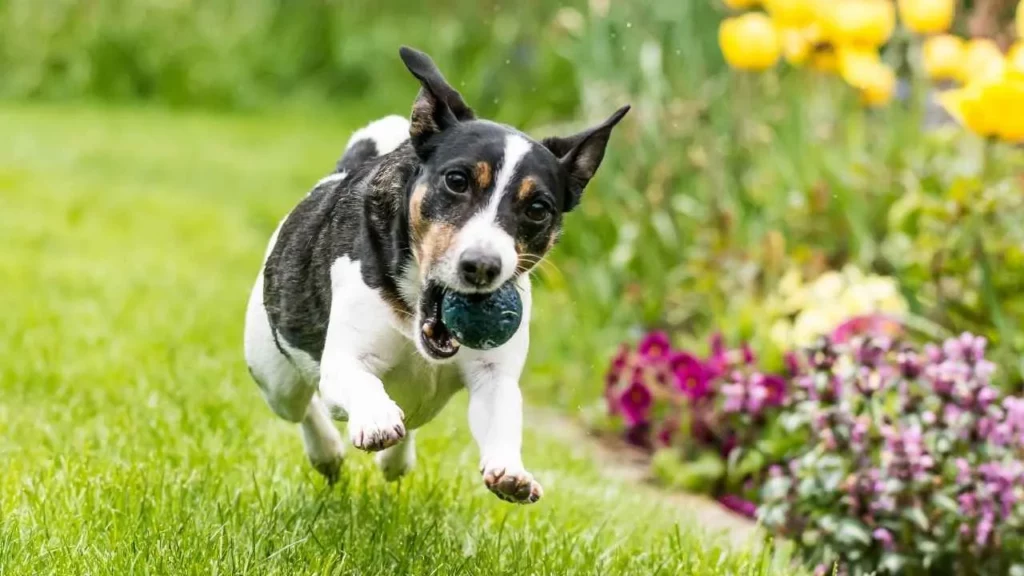
Incredibly intelligent, says PDSA
Easily bored with repetition
Can be stubborn and headstrong
They respond well to positive reinforcement, but they’ll also test your patience just for fun. Say “sit” and they’ll sit. Say it again, and they might just stare at you like, “Why? I already did that.” They need short, engaging sessions that keep their brains firing and their bodies moving.
Training a Jack isn’t about dominance—it’s about partnership (and probably bribery). They’re not mindless followers, they’re sharp little rebels looking for a worthy leader. Are you up for it?
Rat Terrier: Training Ability
Now this is where Rat Terriers shine. They’re smart, eager to please, and just stubborn enough to be interesting, not frustrating. You say “sit,” and they’re like, “Cool, what’s next?” Training them is more of a collaboration than a competition. They want to learn and be part of the action.
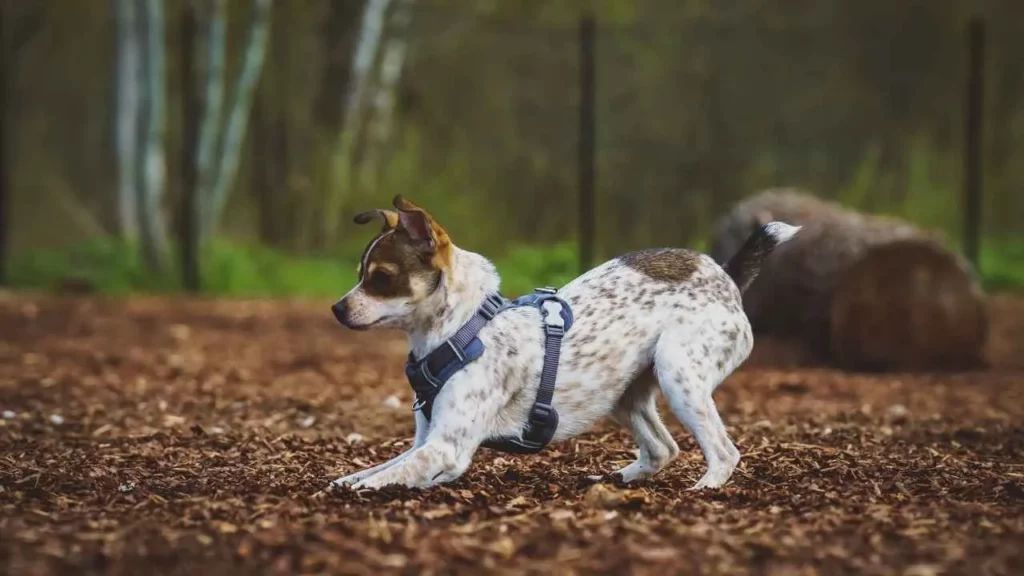
Highly trainable and responsive
Picks up commands quickly
Food-motivated and loves mental challenges
They thrive on structure and variety, so throw in games, tricks, agility, puzzle toys—Rat Terriers eat that stuff up. They’re naturally attentive to their humans, which makes communication and bonding a breeze compared to Jack’s wild-child energy.
Still, don’t mistake “easier to train” for “effortless.” They’re terriers, so that independence is still in there. But overall? Rat Terriers are one of the more cooperative breeds in the terrier family, and they make their humans look good.
Jack Russell Terrier vs. Rat Terrier: Life Expectancy and Health
Jack Russell Terrier: Life Expectancy and Health
Jack Russells are tiny tanks. With a solid life expectancy of 13–16 years, they’re in it for the long run—assuming you can keep up with them! Petplan states that these dogs are generally healthy, tough as nails, and rarely slow down… even when they’re supposed to.
Lifespan: 13–16 years
Common issues: Patellar luxation, deafness, eye disorders
High energy = needs lots of exercise to stay fit and happy
Of course, like any breed, they’re not bulletproof. Joint issues and eye conditions can pop up, especially if they’re not exercised properly or come from poor breeding. But with good care? These dogs age like fine wine—just… louder.
Also, don’t be surprised if your senior Jack is still zooming around like a puppy. They don’t really “retire”—they just slightly lower the intensity of their chaos.
Rat Terrier: Life Expectancy and Health
Rat Terriers are no slouch either when it comes to longevity. They typically live 15–18 years, and with that American farm dog toughness, they’re built to last. Sturdy, resilient, and generally healthy, they’re one of the more low-maintenance breeds in the vet bill department.
Lifespan: 12–18 years, says PetMD
Common issues: Hip dysplasia, allergies, dental issues
Generally hardy with proper care and diet
Their mixed ancestry actually works in their favor here—less inbreeding means fewer genetic issues. But don’t ignore things like routine vet care, good food, and regular exercise. These dogs stay happiest when they’re moving, chewing, and mentally challenged.
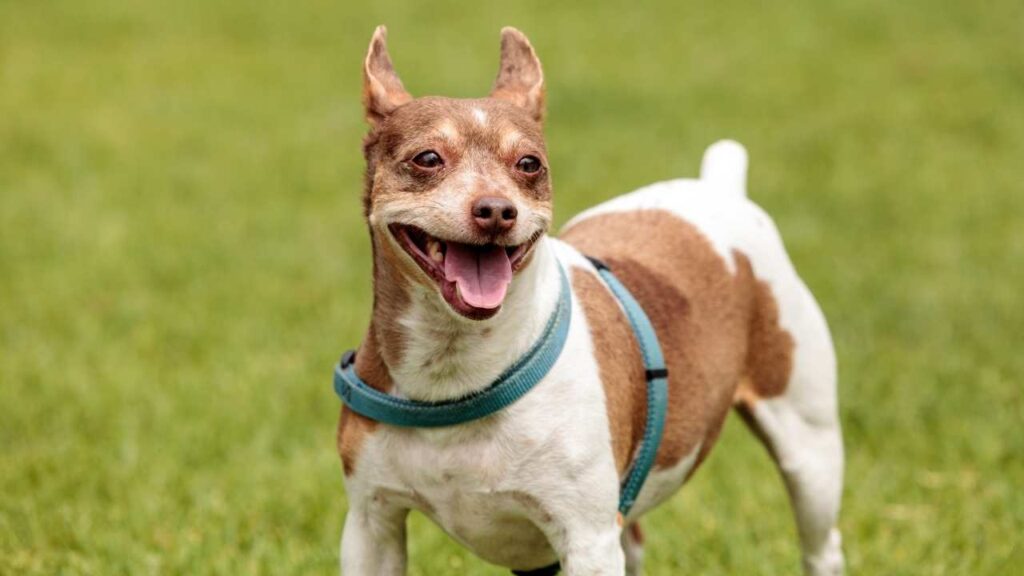
Bonus? Their “off switch” helps conserve energy, so they don’t burn out early like some high-drive breeds. They’re in it for the long game—and they’re happy to play fetch at 14 like it’s day one.
Conclusion
When comparing the Jack Russell Terrier vs Rat Terrier, it’s clear both breeds bring a ton of personality, boundless energy, and a passion for hunting vermin to the table. The Jack Russell, also known as the JRT, is descended from dogs developed by Reverend John Russell in England, bred primarily for fox hunting and farm work. Often confused with the Parson Russell Terrier and Russell Terrier, the Jack Russell Terrier is known for its high energy, strong prey drive, and watch-like alertness. On the other hand, the Rat Terrier, with roots in American farm life, was bred to hunt rats, squirrels, and other pests.
While both breeds are highly intelligent, the Rat Terrier can be slightly more laid back and low maintenance, making them a potentially better choice for homes with kids, cats, or other dogs. Both terriers are small dogs with smooth coats, easy grooming needs, and a tendency to bark, especially when mentally under-stimulated. Their grooming routines are fairly simple, but their mental stimulation needs are not. To avoid problematic behaviors like being too yappy, destructive, or overly excitable, these pups require plenty of exercise, mental challenges, and early socialization.
Ultimately, choosing between the Jack Russell and the Rat Terrier depends on your lifestyle and expectations. If you’re looking for a dog with extreme energy and a fearless attitude, the Jack Russell Terrier is your match, ready to chase a squirrel across the yard or learn new tricks in a flash. If you’d prefer a slightly calmer, yet equally intelligent pet, the Rat Terrier is a great companion, especially for families, kids, or even those with Italian Greyhounds, Whippets, or other breeds.


